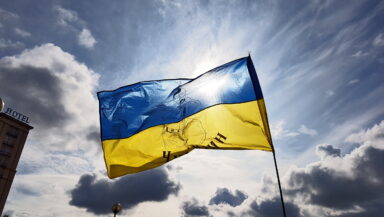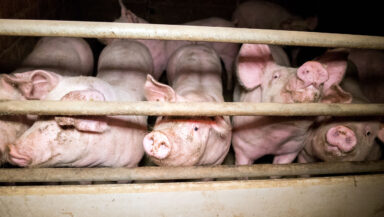In recent weeks, Putin’s invasion of Ukraine has exposed the vulnerabilities, corruption and violence behind the energy system. But the invasion is also accelerating a global food crisis. How we go about tackling it matters.
The conflict in Ukraine is a disaster for the world’s food system
Ukraine produces a sixth of the world’s corn exports, and a large share of its wheat and vegetable oil. The Black Sea ports in the south of the country, which play a key role in the global food system, are completely shut down. The conflict may also disrupt or completely stop Ukraine’s planting season, which was due to start around now.
The conflict has also disrupted the global market in potash, a key ingredient in fertilisers that’s mass-produced in Russia and Belarus. This, combined with rising gas prices, is pushing up the cost of fertilisers used in industrial farming.
The human cost of the food crisis
We can see the tragedy of war directly: the horrific death and destruction; the flow of refugees but less visible crises are spilling out from this war like ripples on a black lake.
Shutting down 12% of the global wheat market in combination with the rise in price of critical fertilisers has spiked the price of wheat and other important foods. Without these fertilisers, global crop production may fall, further pushing up prices.
Many countries in North Africa and the Middle East are heavily dependent on wheat from Ukraine. Countries like Egypt, Algeria, Tunisia and Libya produce less than half of the wheat their people eat every year. With billions of people already living in profound poverty, any rise in food prices is likely to be devastating.
We need to rethink how we do agriculture. We face a crisis in Ukraine and a broken food system that’s straining under rising demand for food, the impacts of climate change, and the declining health of soils due to overuse of agro chemicals. Industrial farming is also a driver of climate change. Greenhouse gas emissions from this sector alone are on course to break the climate system.
Feed people not factory farms
One of the keys to solving these problems is reducing the consumption of meat. That may seem counterintuitive – how do you increase the amount of food we have by reducing consumption of this supposedly key part of it?
Basically, if you feed grains or beans to animals they then turn that feed into meat, but in the process there are big losses – the food conversion ratio. Even with poultry, which is by far the most ‘efficient’ converter of feed to meat, the losses are between two and five times.
That means if we reduce the amount of grains and beans we feed to farmed animals and instead use them directly as humans, current crop lands can feed a lot more people. At the same time we can enjoy healthier soils and more wildlife by reducing our reliance on agro chemical fertilisers and pesticides. On top of that, you do the essential work of reducing emissions by having smaller numbers of farm animals.
Some industrial farm lobbyists argue that we need to roll back commitments on rewilding, on farm wildlife and habitat protection to boost production. This makes no sense in terms of long term food security, and will just accelerate the climate and biodiversity crisis. Reducing meat consumption allows us to make good those commitments and increase supply of grains and beans at this critical time.
Feed people not cars!
Using crops for energy or to fuel cars instead of people is a poor use of land. In the UK around 2.1% of crop land is used for growing plants for biogas or bioethanol but the overall land footprint far greater as we import around 90% of the biofuel the UK uses . In a situation where food prices are rising fast and the UN predicts that we need to be producing 70% more food globally by 2050 there is no excuse for this waste of land. Biofuels using crops should be banned immediately. Yes, that might push up demand for oil by a small amount, but there are good ways of reducing oil demand in the short term such as 55 mph speed limits, free public transport, scrappage schemes that give tokens for electric bikes or public transport and restrictions on car use in cities.
What we need to do to get through this crisis and start fixing the broken food system.
The Ukraine crisis has highlighted the weaknesses of the global food system. It’s time we fix them. Food price rises can be a matter of life or death for the least well off around the world, particularly in Africa and the Middle East. The response to this crisis should be based on need, not on the colour of a person’s skin or proximity to Europe.
There are five key emergency measures that are needed to deal with this food crisis and to start solving what was already a serious problem.
- No one should go hungry as a result of this invasion. Wealthy nations must provide extra payments for the World Food Programme to help feed vulnerable people in Africa and the Middle East.
- Reduce the amount of meat and dairy we eat, and feed animals on food waste, crop byproducts and on grassland that can’t be used for food crops Food that people can eat should feed people.
- Stop using agricultural land to produce biofuels for cars, trucks and power plants.
- Start the shift to agroecology and food self reliance and support farmers in the process. We desperately need to get off fossil fuels. Relying on industrial chemicals to grow food makes our food supply less secure.
- Here in the UK it’s time to reform social security and tackle a system of in-work poverty. It’s inexcusable that in the world’s sixth-wealthiest nation millions are having to choose between heating and eating. The government should explore options like a minimum living income to guarantee those on low incomes the ability to both eat properly and heat their homes, alongside tackling low wages.
That might all sound challenging, but remember the response to covid; the billions spent on armaments or on propping up the banks in 2008. Stopping global famine, dealing with climate change and creating a more resilient food system should be reason enough for governments to intervene.



